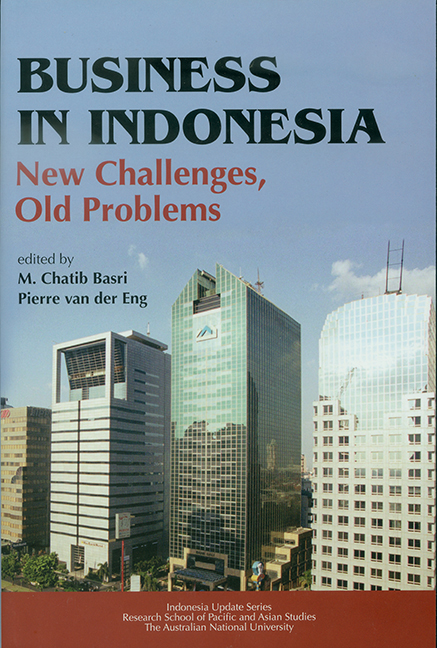Book contents
- Frontmatter
- Contents
- Tables
- Figures
- Contributors
- Acknowledgments
- Glossary
- 1 Business in Indonesia: Old Problems and New Challenges
- PART I Political and Economic Developments
- PART II Overview of the Business Environment
- PART III Foreign Investment and Trade
- PART IV Key Issues in the Business Environment
- 8 The Effects of Decentralisation on Business in Indonesia
- 9 Political Economy of Privatisation of State-owned Enterprises in Indonesia
- 10 Corporate Ownership and Management in Indonesia: Does It Change?
- 11 Tinkering Around the Edges: Inadequacy of Corporate Governance Reform in Post-Crisis Indonesia
- 12 Upholding Indonesian Bankruptcy Legislation
- 13 The Private Sector Response to Public Sector Corruption
- 14 A Challenge for Business? Developments in Indonesian Trade Unionism after Soeharto
- 15 Labour Regulation and the Business Environment: Time to Take Stock
- References
- Index
- Indonesia Update Series
9 - Political Economy of Privatisation of State-owned Enterprises in Indonesia
from PART IV - Key Issues in the Business Environment
Published online by Cambridge University Press: 21 October 2015
- Frontmatter
- Contents
- Tables
- Figures
- Contributors
- Acknowledgments
- Glossary
- 1 Business in Indonesia: Old Problems and New Challenges
- PART I Political and Economic Developments
- PART II Overview of the Business Environment
- PART III Foreign Investment and Trade
- PART IV Key Issues in the Business Environment
- 8 The Effects of Decentralisation on Business in Indonesia
- 9 Political Economy of Privatisation of State-owned Enterprises in Indonesia
- 10 Corporate Ownership and Management in Indonesia: Does It Change?
- 11 Tinkering Around the Edges: Inadequacy of Corporate Governance Reform in Post-Crisis Indonesia
- 12 Upholding Indonesian Bankruptcy Legislation
- 13 The Private Sector Response to Public Sector Corruption
- 14 A Challenge for Business? Developments in Indonesian Trade Unionism after Soeharto
- 15 Labour Regulation and the Business Environment: Time to Take Stock
- References
- Index
- Indonesia Update Series
Summary
Together with fiscal austerity and market liberalisation, the privatisation of state-owned enterprises (SOEs) was one of three pillars of International Monetary Fund (IMF) advice given to governments of less developed countries throughout the 1980s and 1990s (Stiglitz 2002: 53). Privatisation involves the transfer of responsibilities from the public to the private sector. Proponents argue that it lowers costs, improves the quality of goods and services, increases consumer choice and results in the more efficient allocation of resources. However, Zinnes, Eilat and Sachs (2001: 146) found that economic performance gains come only from ‘deep’ privatisation. Hence, the success of a privatisation program will depend on the level of complementary reforms.
Hill (2000a: 103–109) noted that until the early 1990s the aggregate performance of SOEs in Indonesia was poor, prompting calls for reform and reorganisation through the privatisation of SOEs. Semen Gresik, a cement company, was the first Indonesian SOE to be privatised. It was listed on the Jakarta Stock Exchange (JSE) in July 1991 after a successful initial public offering (IPO). This divestiture was followed by other privatisations, including that of Indosat (1995), Telkom (1995), Bank BNI (1996) and Timah (1996). All were relatively successful. The two profitable telecommunications SOEs, Indosat and Telkom, have even been listed on the New York Stock Exchange.
Although most of the early cases of privatisation went smoothly, today the privatisation process is mired in controversy. The trouble began at the time the government sold a 14 per cent stake in Semen Gresik to strategic investor Cemex in September 1998, at the peak of the 1997–98 economic crisis. Several issues came to a head, making this Indonesia's most complicated divestiture case so far. The size of the divestiture (which lowered the government holding in the company to 51 per cent), the low price obtained for the shares and the implications of the sale for some of the companies in the Gresik holding company, especially Semen Padang, led to strong opposition from the public, parliaments (both central and local) and local government.
Although opinion is now divided, the partial divestiture of Telkom in 1995 can be considered a successful case in Indonesia's privatisation program. The divestiture was accompanied by agreements with several leading international telecommunications companies to invest in five of seven regions in Indonesia.
- Type
- Chapter
- Information
- Business in IndonesiaNew Challenges, Old Problems, pp. 141 - 157Publisher: ISEAS–Yusof Ishak InstitutePrint publication year: 2004



